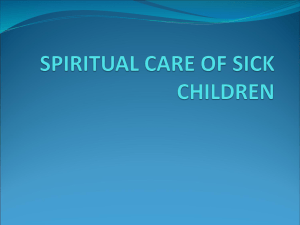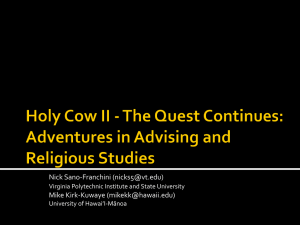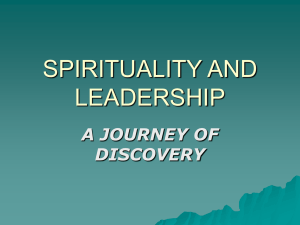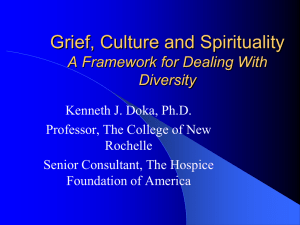Meeting spiritual needs within occupational therapy practice
advertisement
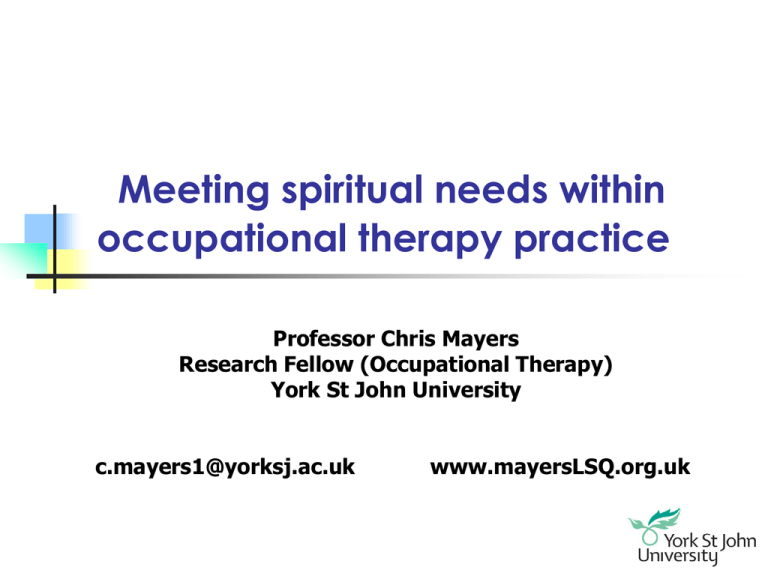
Meeting spiritual needs within occupational therapy practice Professor Chris Mayers Research Fellow (Occupational Therapy) York St John University c.mayers1@yorksj.ac.uk www.mayersLSQ.org.uk Definition: Occupational Therapy Occupational therapists acknowledge the link between what people do and their health and wellbeing. To the profession, ‘occupation’ means all the activities that a person finds meaningful, enjoys and values. These occupations fall within the areas of work/productivity, play/leisure, rest, and personal and domestic self-care We work alongside people with many sorts of problems, including mental health issues, to enable each person to participate in a self-determined balance of meaningful occupations in order to maximise his/her abilities and enhance quality of life. As occupational therapists, with personcentred practice central to the philosophy underlying our practice, we value and respect the priorities, choices, needs, occupations and feelings of the people with whom we work – and this also includes the area of ‘spirituality’. This presentation will include.. a brief exploration of the term ‘spirituality’ consideration of the relationship between spirituality, motivation and meaningful occupation how spiritual needs can be assessed and met by occupational therapists Defining spirituality Stoll (1989) identified vertical and horizontal components of spirituality Stoll, 1989 The vertical component involves a person’s relationship with a higher power (experiencing God as a transcendent and/or personal being) and/or the horizontal component is one’s relationship with self, others and environment, often referred to as humanistic values and beliefs. An individual’s definition of spirituality includes some, or all, of the following aspects … a search for meaning & purpose to life a search for activities that give meaning and value to an individual’s life a quest for ‘wholeness’, integration of mind, body and spirit a belief in God or some form of higher power a sense of ‘connectedness’ to God, self, others, nature and that these personal beliefs or faith ‘shape’ a person’s perspective of the world & how she/he lives life (Johnson & Mayers, 2005; Cornah, 2006) The spiritual aspect of your meaningful occupations may be totally different to mine; the spiritual meaning of any occupation that we choose to undertake will be very personal, as it is for all the users of our services. The relationship between our spirituality, motivation and occupation Underlying the motivation and reasons for undertaking any task / occupation are a set of conscious / unconscious beliefs and values, the reasons ‘why we do what we do’; these could be said to be the ‘spiritual’ aspect of us as humans. This ‘spiritual’ aspect has a wide spectrum and gives us an inner ‘energy’ to participate in chosen occupations (Mayers, 2004). Our spirituality enhances the occupations that we chose to undertake and that are meaningful to us … Sunset Flowers … and also our spirituality is the motivating force that encourages us to take part in these occupations. As occupational therapists, with meaningful ‘occupation’ central to our philosophy, we have every opportunity to help meet the spiritual needs of our clients as we enable them to do the occupations that they enjoy. The Mental Health Foundation (2006) ‘one of the key contributions of spirituality in the lives of these individuals (people with depression) … may be the power it offers to restore meaning, purpose and hope to their lives.’ … and surely this is so for people with any sort of disability / social deprivation. Assessing and meeting spiritual need ‘ Spiritual need I would think of as the same as any other sort of need’. ‘…if someone has something that is important to them…we should do the best we can to help them fulfil that need’. Collins et al. (2001) n= 112 107 (95.6%) of their participants believed spiritual well-being was an important component of good health and 51 (45.5%) agreed or strongly agreed that therapists should address spiritual concerns with clients. However, the appropriateness of addressing spiritual issues was concluded to be situational based, e.g. only if the client brings it up. So how can occupational therapists discover if this is an important area for our service users? The Mayers’ Lifestyle Questionnaires (1), (2) & (3) www.mayersLSQ.org.uk Developed to enable service users to indicate their priority quality of life needs right at the beginning of intervention. (1): for people with problems related to physical disability (2): for people with enduring MH problems (3): recently developed, specifically for older people Sections within the Mayers’ LSQ (2) 1. 2. 3. 4. 5. 6. 7. 8. 9. Looking after yourself Living situation Looking after others Being with others Being in and out of work/attending college Your beliefs and values Finances Choices Activities you enjoy doing / want to do Unless we discuss an individual’s quality of life with them, we cannot initiate a person-centred approach… which means we cannot discover their level of motivation, interests (meaningful occupation) and values (spirituality) Section 6. Your Beliefs and Values Do you have: religious / spiritual beliefs that are important to you? do you like to be with others who have similar beliefs / values? are you able to join others with similar beliefs? Older people with dementia: examples of people/occupations enhancing their spirituality Friends, family A sense of belonging, being with others Having a clear role – being a grandparent Undertaking outdoor pursuits – gardening, walking, listening to/watching birds, enjoying change of seasons Attending church and being part of that community ‘I’ve got a rose in front of my window. It’s only one little rose on its own and … I just feel as if it’s been put there for me’ References Collins JS, Paul S and West-Frasier J (2001) The utilization of spirituality in occupational therapy: beliefs, practices and perceived barriers. Occupational Therapy in Health Care, 14(3/4), 73-92. Cornah D (2006) The impact of spirituality on mental health – a review of the literature. London, Mental Health Foundation Hoyland M and Mayers CA (2005) Is meeting spiritual need within the occupational therapy domain? British Journal of Occupational Therapy, 68 (4), 177-180 Johnston D and Mayers CA (2005) Spirituality: a review of how occupational therapists acknowledge, assess and meet spiritual needs. British Journal of Occupational Therapy, 68 (9), 386-392 Mayers CA (2004) Editorial: Towards understanding spirituality. British Journal of Occupational Therapy, 67 (5), 191 Mueller PS, Plevak DJ and Rummans TA (2001) Religious involvement, spirituality and medicine: implications for clinical practice. Mayo Clinic Proceedings, 76(12), 1225-1235. Stoll R (1989) The essence of spirituality. In Carson V (Ed.) Spiritual Dimensions of Nursing Practice. Philadelphia: WB Saunders. www.mayersLSQ.org.uk c.mayers1@yorksj.ac.uk


